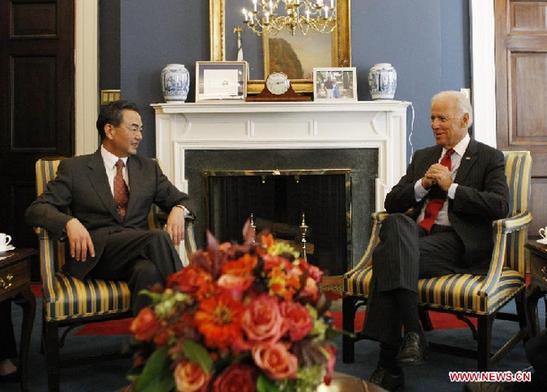
China-US ties vital for dealing with global challenges
Xinhua, September 20, 2013
-
U.S. Vice President Joe Biden on Thursday expressed optimism about the future development of Sino-U.S. relations, which he says are crucial to humankind's success in tackling global challenges in the 21st century.

U.S. Vice PresidentJoe Biden (R) meets with Chinese Foreign Minister Wang Yi in Washington D.C., United States, Sept. 19, 2013. [Xinhua/Fang Zhe]
Biden made the remarks during his meeting at the White House with visiting Chinese Foreign Minister Wang Yi, who is on his first official visit to the United States since taking office in March.
Biden said he has always believed that China's development is in the interests of not only the United States, but also the whole world.
Optimistic about the future of bilateral ties, Biden said he and President Barack Obama firmly believe that the success of humankind in the 21st century very much hinges on how the two countries handle their relations and cooperate on global challenges.
The vice president added that increasing people-to-people exchanges and mutual trust are indispensable for advancing China-U.S. ties, while a close relationship and smooth communication between their leaders will also play a vital role in guiding the development of future bilateral ties.
Biden said he treasures his good friendship and working relationships with Chinese leaders including President Xi Jinping, and looks forward to visiting Beijing once again to contribute to the development of a new model of major-country relations between the two nations.
Wang conveyed to Biden greetings and an invitation for an official visit from Chinese leaders. He also explained China's principled position on developing future China-U.S. ties, while elaborating on China's policies and ideas on how to boost the mutually beneficial cooperation at the present time.
Before meeting with Biden, Wang met with U.S. National Security Advisor Susan Rice to exchange views on issues related to international security. Wang also met with some U.S. Congressional leaders, including Senate Minority Leader Mitch McConnell and House Foreign Affairs Committee Chairman Ed Royce.
Earlier on Thursday, Wang Yi held talks with U.S. Secretary of State John Kerry to discuss a wide range of issues of mutual concern, including Syria, the stalled six-party talks on the Korean Peninsula denuclearization, U.S. arms sales to Taiwan, maritime security, cyber security and intellectual property protection.
The Chinese diplomat told reporters that one of the major goals of his visit is "sending out a signal that the two countries are willing to advance the new model of major-country relationship through concrete actions and practical cooperation."
Kerry said that as the new model of China-U.S. relationship is based on practical cooperation and constructive management of differences, the U.S. and China recognize the need "to avoid falling into a trap, of seeing one another as strategic rivals."
On Syria, Wang pledged that China will play "a positive and constructive role" at the United Nations in helping resolve the crisis over Syria's chemical weapons, which he said ultimately needs to be resolved through political means.
After his two-day stay in Washington, Wang will travel to New York on Saturday to attend the 68th session of the UN General Assembly.